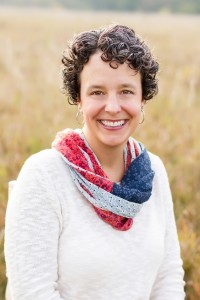This guest post is brought to you by Mary Kay Devine, a Chicago-based feminist and mother of four. Mary Kay’s day job is the Director of Community Initiatives at Women Employed, a nonprofit that mobilizes people and organizations to expand educational and employment opportunities for America’s working women. Founded in 1973, WE has a 40-year track record of opening doors, breaking barriers, and creating fairer workplaces for women. For more information, visit www.womenemployed.org. PS. I love this org! – Deborah
 March is Women’s History Month – a month when the American public honors women and their voices. But even in 2014, we’re not hearing enough of those voices. The Women’s Media Center recently released their annual report on the state of women in the media, and the numbers were grim. Male front-page bylines in print media outnumber female front-page bylines by 3 to 1. Only 25% of guests on Sunday talk shows are women. Men write the majority of newspaper op-eds. And all-too-often, women reporters are still consigned to writing about “pink topics” like food and fashion.
March is Women’s History Month – a month when the American public honors women and their voices. But even in 2014, we’re not hearing enough of those voices. The Women’s Media Center recently released their annual report on the state of women in the media, and the numbers were grim. Male front-page bylines in print media outnumber female front-page bylines by 3 to 1. Only 25% of guests on Sunday talk shows are women. Men write the majority of newspaper op-eds. And all-too-often, women reporters are still consigned to writing about “pink topics” like food and fashion.
Women Employed, an organization that has spent the last four decades opening doors, breaking barriers, and creating fairer workplaces for women, recently brought two prominent journalists together to discuss the ongoing problem of gender discrimination. They talked about gender bias in newsrooms, and also in other workplaces, as well as what women can do about it.
“We loved Newsweek! We just wanted Newsweek to be better for women.” That’s what author and trailblazing journalist Lynn Povich told the sold-out crowd at The Newsweek case that changed the workplace…or did it? Povich shared the story of how she and her female colleagues confronted blatant sexism at Newsweek in the 1960s. In an era when female employees were told that “women don’t write at Newsweek,” they refused to accept it. She and 45 of her female colleagues brought a landmark lawsuit against the magazine in 1970—and won! Povich eventually became not only a writer for Newsweek, but also their first female senior editor.
Povich was joined by Jesse Ellison, a recent Newsweek writer who, forty years after the original lawsuit, came to realize that she and the other women around her were still experiencing gender discrimination. “The young men around us were getting much better story assignments, they were getting raises and promotions much more easily… We were each having to work much harder than our male peers to get to the same end.” So in 2010, she banded together with her female colleagues to co-author a Newsweek article on the 40th anniversary of the landmark lawsuit questioning how much has actually changed for working women.
These two women highlighted the similarities and the differences in their struggles, pointing out that women today don’t suffer the overt workplace discrimination that Mad Men-era women had to endure. However, they still face obstacles. It’s just that those obstacles are so much more subtle and harder to identify. For working women today, one of the biggest challenges is never being sure if their inability to advance is a personal failure or a result of gender bias.
That makes it in some ways a much harder battle. But as Ellison’s experiences show, it’s not an impossible fight. Both Povich and Ellison stressed that if you are a woman who has been frustrated in her attempts to succeed at work, it’s vital that you not be afraid to speak to your colleagues, both female and male, to determine if what you’re experiencing could be a systemic problem. And then you should act. The experiences of both women show that change can happen, and it can happen from within. When people band together for change, they are powerful, and they can make a positive difference.
Hear what Povich and Ellison have to say about their experiences at Newsweek, about fighting gender discrimination in the Mad Men era and the modern era, and about what still needs to change:
And see their message for working women:
And then go out, make change, and help ensure that more women’s voices are heard, not just this month, but in EVERY month! Here are some ways you can help: http://womenemployed.org/act

